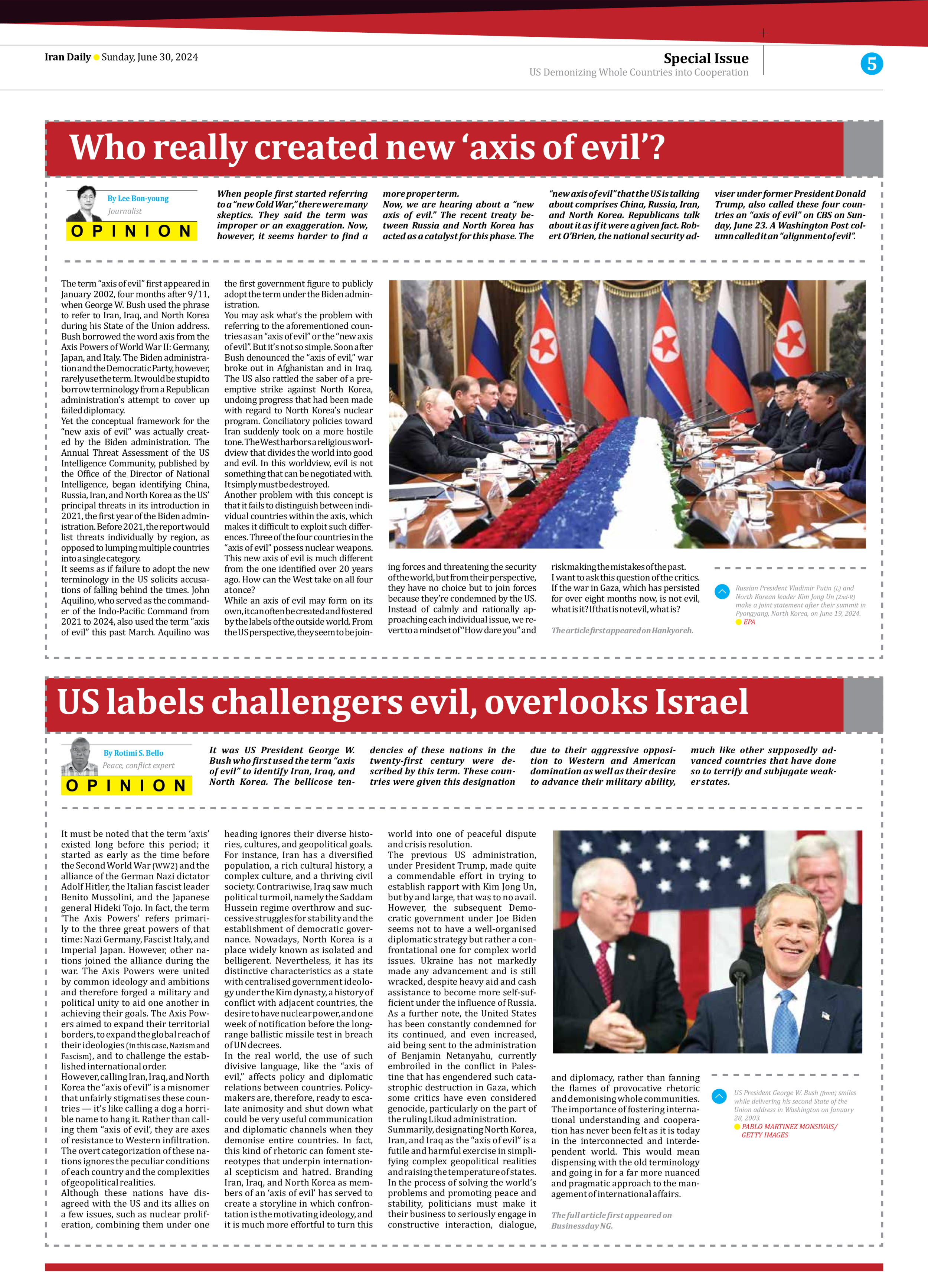
US labels challengers evil, overlooks Israel
It was US President George W. Bush who first used the term “axis of evil” to identify Iran, Iraq, and North Korea. The bellicose tendencies of these nations in the twenty-first century were described by this term. These countries were given this designation due to their aggressive opposition to Western and American domination as well as their desire to advance their military ability, much like other supposedly advanced countries that have done so to terrify and subjugate weaker states.
By Rotimi S. Bello
Peace, conflict expert
It must be noted that the term ‘axis’ existed long before this period; it started as early as the time before the Second World War (WW2) and the alliance of the German Nazi dictator Adolf Hitler, the Italian fascist leader Benito Mussolini, and the Japanese general Hideki Tojo. In fact, the term ‘The Axis Powers’ refers primarily to the three great powers of that time: Nazi Germany, Fascist Italy, and Imperial Japan. However, other nations joined the alliance during the war. The Axis Powers were united by common ideology and ambitions and therefore forged a military and political unity to aid one another in achieving their goals. The Axis Powers aimed to expand their territorial borders, to expand the global reach of their ideologies (in this case, Nazism and Fascism), and to challenge the established international order.
However, calling Iran, Iraq, and North Korea the “axis of evil” is a misnomer that unfairly stigmatises these countries — it’s like calling a dog a horrible name to hang it. Rather than calling them “axis of evil’, they are axes of resistance to Western infiltration. The overt categorization of these nations ignores the peculiar conditions of each country and the complexities of geopolitical realities.
Although these nations have disagreed with the US and its allies on a few issues, such as nuclear proliferation, combining them under one heading ignores their diverse histories, cultures, and geopolitical goals. For instance, Iran has a diversified population, a rich cultural history, a complex culture, and a thriving civil society. Contrariwise, Iraq saw much political turmoil, namely the Saddam Hussein regime overthrow and successive struggles for stability and the establishment of democratic governance. Nowadays, North Korea is a place widely known as isolated and belligerent. Nevertheless, it has its distinctive characteristics as a state with centralised government ideology under the Kim dynasty, a history of conflict with adjacent countries, the desire to have nuclear power, and one week of notification before the long-range ballistic missile test in breach of UN decrees.
In the real world, the use of such divisive language, like the “axis of evil,” affects policy and diplomatic relations between countries. Policymakers are, therefore, ready to escalate animosity and shut down what could be very useful communication and diplomatic channels when they demonise entire countries. In fact, this kind of rhetoric can foment stereotypes that underpin international scepticism and hatred. Branding Iran, Iraq, and North Korea as members of an ‘axis of evil’ has served to create a storyline in which confrontation is the motivating ideology, and it is much more effortful to turn this world into one of peaceful dispute and crisis resolution.
The previous US administration, under President Trump, made quite a commendable effort in trying to establish rapport with Kim Jong Un, but by and large, that was to no avail. However, the subsequent Democratic government under Joe Biden seems not to have a well-organised diplomatic strategy but rather a confrontational one for complex world issues. Ukraine has not markedly made any advancement and is still wracked, despite heavy aid and cash assistance to become more self-sufficient under the influence of Russia. As a further note, the United States has been constantly condemned for its continued, and even increased, aid being sent to the administration of Benjamin Netanyahu, currently embroiled in the conflict in Palestine that has engendered such catastrophic destruction in Gaza, which some critics have even considered genocide, particularly on the part of the ruling Likud administration.
Summarily, designating North Korea, Iran, and Iraq as the “axis of evil” is a futile and harmful exercise in simplifying complex geopolitical realities and raising the temperature of states. In the process of solving the world’s problems and promoting peace and stability, politicians must make it their business to seriously engage in constructive interaction, dialogue, and diplomacy, rather than fanning the flames of provocative rhetoric and demonising whole communities. The importance of fostering international understanding and cooperation has never been felt as it is today in the interconnected and interdependent world. This would mean dispensing with the old terminology and going in for a far more nuanced and pragmatic approach to the management of international affairs.
The full article first appeared on
Businessday NG.







